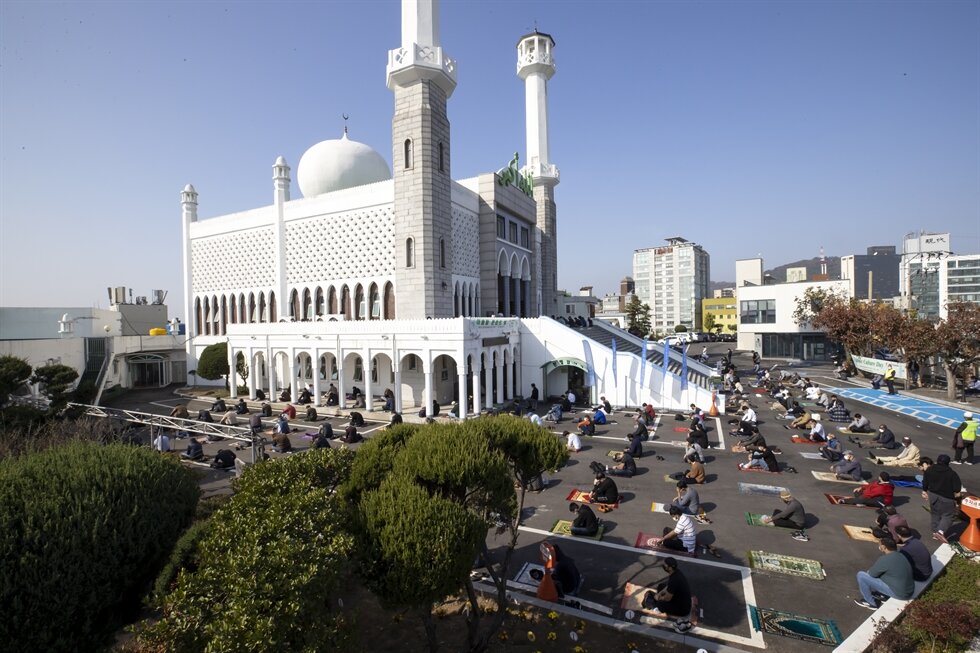Hawzah News Agency – The arrival of 500 Yemeni asylum seekers on Jeju Island in 2018 sparked debate over how the country handles refugees, including an online backlash, a petition for the government to take action, and anti-refugee protests on Jeju and in Seoul.
Yi Soo-jeong, a senior research fellow at the Sogang Euro-MENA Institute, recalls that this event prompted her to study the mosques serving the Muslim communities of Korea.
"It started with a simple question: where exactly and how do Muslims in Korea practice their faith? As I delved deeper into the matter, I grew to understand that there are around 100-150 Islamic religious facilities in Korea, many of them relatively small," she said during a recent interview with The Korea Times.
Yi's new book "Broader Perspective for Strangers" tells a story about her 2018-2019 journey of searching for mosques and Islamic centers in Korea, Muslim communities' experiences of intolerance and discrimination within Korean society, and why achieving peaceful coexistence with Muslims matters today.
As a scholar specializing in Islamic Studies, she was able to establish a rapport with Muslims instantly.
"Many Koreans have suspicions and fears of Muslims, but in fact, many Muslims also live in fear. Some of the people I met in mosques hid or moved out of the place as soon as I entered because to them, I'm the foreigner," she said.
The number of Muslims in Korea stands at under 200,000 today, roughly 0.4 percent of the population, according to an estimate by the Korea Muslim Federation. The majority are workers and students from countries such as Uzbekistan, Indonesia, Kazakhstan, Bangladesh and Pakistan.
Yi said people with anti-Islamic views have led Muslims to keep a low profile when practicing their faith. The Islamic communities have been trying to enjoy their religious freedom without facing harsh opposition from neighbors.
"A majority of Muslims are young men. They are here to earn foreign currency, just like Korean miners in Germany did in the 1960s and 1970s. Considering affordability and accessibility when it comes to establishing Islamic centers, many Muslims gather in 'musallas,' or places of worship, in smaller cities," she added.
Yi argued that COVID-19 intensified anti-Muslim sentiment in Korea. Last year, the fact that 50 Muslims tested positive for COVID-19 during Ramadan fueled online hate speech. In addition, Muslims also faced a backlash over the construction of a two-story mosque in a residential district of Daegu.
"Instances of hate speech, discrimination and xenophobia rose after the pandemic," she said.
Yi explained the reasons behind the conflict regarding the mosque's construction in Daegu.
"The first reason is Islamophobia. However, it's actually a clash of property rights. Korean residents who oppose the construction are afraid that the price of their house may fall," she said.
"Then there is the security issue. The public officials fear they might be extremist Muslims. Even if there is one among 250,000 Muslims who poses a severe threat to the society, it's going to be a big problem. Finally, there is racial hatred based on willful ignorance. This is very difficult to solve."
Yi called on the government to establish an arbitration committee or an open forum to reach an agreement between Muslims and Koreans.
"In England and Germany, there is a forum for regular and ongoing dialogue between all levels of government and Muslims. Even it takes years, the government needs to coordinate Korean residents and Muslim communities," she said.
According to Yi, years of low birthrates have led to a shortage of young workers. Farms and factories find it more difficult to fill low-wage jobs and universities lack local students. That leaves Korea with no other choice but to open its doors to workers and students from other countries. Muslims are the world's fastest-growing religious group because the global Muslim population is growing.
"Korea is already a multicultural country. If foreigners account for more than 5 percent of the total population, it constitutes a multicultural, multiracial society according to OECD standards. The number of foreign residents topped 2.5 million, accounting for 4.9 percent of the total population in 2019," she said.
Yi shared her thoughts on what improvements the country needs to make in the next administration.
"The biggest problem with the current immigration policies is that they are scattered across several ministries. The government needs a control tower to formulate integrated plans," she said.
Currently, the Ministry of Justice manages visa applications and foreign entry, while the Ministry of Employment and Labor monitors and regulates migrant workers who enter the country under the Employment Permit System, and the Ministry of Gender Equality and Family runs policies related to marriage migrants and their families.
Although there is still a long way to go, Yi has noticed a slight softening in people's attitudes.
"I think we are in the middle of building denser social networks. Although confusion and objections are widespread, Korea is slowly opening its doors to Muslims."
Last year, 391 Afghans entered Korea under the name of "special contributors" instead of refugees. The government has worked at pace to find homes, jobs and schools for them.
"Despite the contention, I feel proud that our dealing with such issues means Korea enhanced its standing in the international community. It's part of our duty to embrace different cultures, religions, races and nationalities and find common ground between Koreans and Muslims," she said.


Your Comment